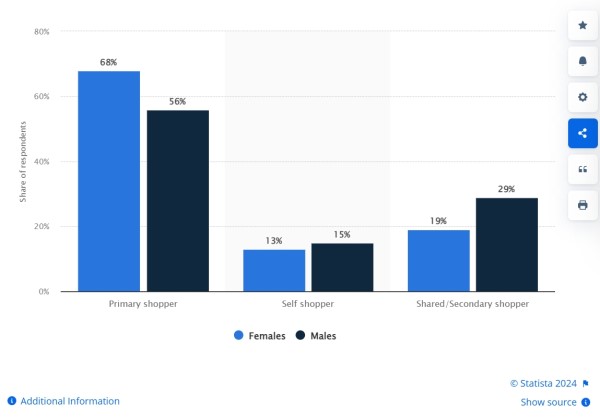Gender Trends in retail shopping
I was listening to a talk on retailing. One point that became clear is the growing importance of males in shopping today. We are seeing a remarkable shift underway in today's shopper demographics, challenging long-held beliefs about who does the shopping. Contrary to traditional notions, men shop for basics almost as frequently as women.
Too many retailers are not considering this.
Where there was a family in the United States in 2023 by gender; this was the grocery shoppers. Check this chart below.

I found it interesting that if someone is shopping for themselves, men and women are now doing their shopping.
In another study, I found the result was 51% for women and 49% for men.
Gender consumer behaviour
While the frequency of shopping today is comparable between genders, studies do show notable distinctions in gender behaviour:
-
Spending Power: Women spend more per trip than their male counterparts. This difference is why women hold a more prominent role in shopping.
-
Shopping Preferences: Men are generally more inclined to shop online and at convenience stores. They like the convenience of these channels. Women seem more likely to shop in physical shops as they prefer the in-person shopping experience.
-
Shopping Mindset: Men are likelier to have a predetermined plan and, most importantly, stick to it. If a male comes to your shop, you better have what he wants. Women are more open to impulse purchases.
-
Price Sensitivity: Men are typically less price-sensitive than women shoppers. Therefore, you could market higher-priced items to males than females.
Implications for Retailers
-
Optimize Store Layout: Evaluate your store layout. Retailers must ensure that the items men are looking for, such as staple goods and household supplies, are prominently displayed and easily accessible while creating dedicated browsing zones for women.
-
Strategic Merchandising: For males, consider going upmarket. If dealing with women, you need to make sure the area has plenty of cross-merchandising and impulse product placement to encourage impulse purchases and cater to women's shopping tendencies.
-
Gender-based marketing: If you are marketing to men, emphasise convenience, while for women, highlight promotions, new products, and their in-store experience.
Adapting to the New Normal
You need to consider your shop to better accommodate these trends.


